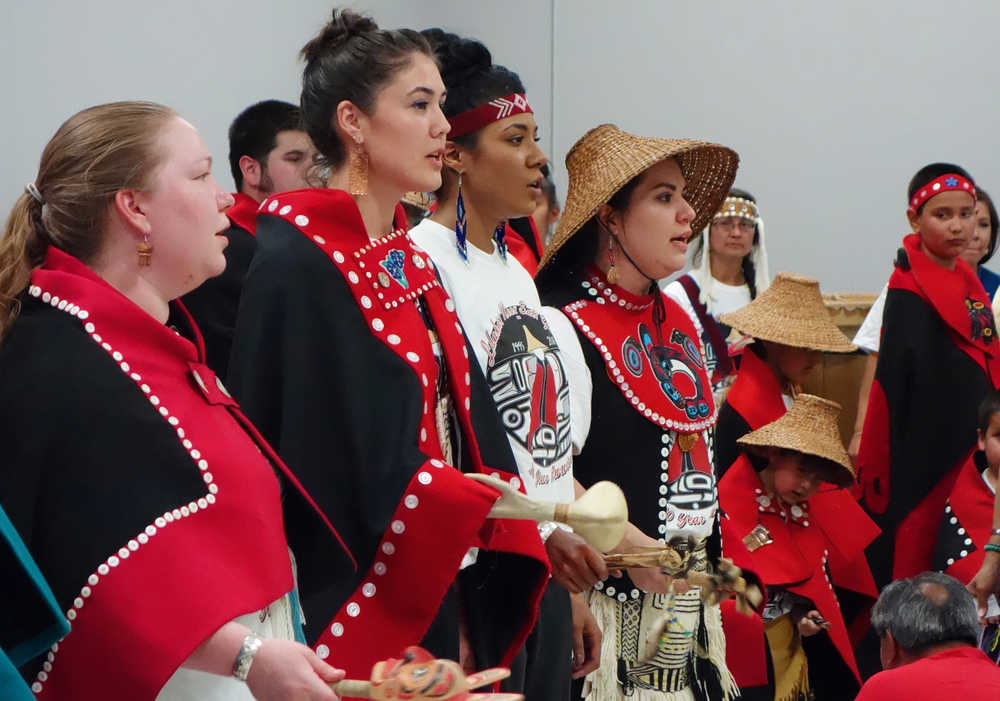Juneau resident Vicki Soboleff, founder of the dance group Ldakát Naax Satí Yátx’i (All Nations Children), is to be honored this year with the Margaret Nick Cooke Award for Alaska Native Arts and Languages.
The dance group, which focuses on instilling cultural pride and self esteem, had its 20th anniversary in August 2015; children of any heritage can dance with the group until they graduate high school.
Juneau resident Barbara Dude, who has been involved in the group for most of her life, now leads it and credits much of her success in life to the group, Soboleff, and assistant leaders. Now, she’s a college graduate, a social worker and a mother of two. She told the Capital City Weekly last August that Soboleff, who was the group’s “strict mom,” picked her up every morning her last year of high school, sometimes actually pulling her out of bed, and took her to school to make sure she graduated.
Soboleff formed Ldakát Naax Satí Yátx’i in 1995, when she was 32.
“I saw a need for children to have cultural pride and knowledge of self and family to help them in their self esteem and their attainment of success,” she said back then.
Soboleff was born and raised in Ketchikan. As a middle schooler, she was embarrassed when her grandmother made her perform Haida songs and dances at assemblies.
“I definitely felt uncomfortable about being Native because of racism that I felt,” Soboleff said. “The last thing I wanted to do was dance in front of my school.”
Later, pride in her culture would help Soboleff deflect racist comments and actions, and influence generations of children to draw strength from their Native culture.
She enlisted current Kiks.adi leader Ray Wilson to help when the group was still new. Wilson had grown up at a time when his culture had been suppressed. When the group formed, Wilson was just learning the songs and dances himself. He tried to decline, saying he didn’t know enough, but Soboleff told him, “You know more than they do.”
Wilson and Soboleff believe the group has helped children whose parents may have struggled through trauma related to poverty, abuse, substance abuse and more, stemming from generations of systemic racism.
“Their culture is their armor,” Wilson said.
They have observed that knowledge and pride in their Native culture helps children to be more successful.
The group performs frequently at Goldbelt Mount Roberts Tramway in the summer, and at other venues as well.
In the 20 years since the dance group started, Soboleff has seen improvements both in the community’s attitude and in the self-esteem of young Native people, though there is still room for more.
At the first practice, in 1995, around a dozen children attended; now dozens show up at the Tlingit-Haida Community Council Center for practices each Thursday. Many of them, according to Sealaska, where Soboleff works as corporate controller, are younger than 10; many alumni of the group have gone on to great success in their adult lives.
Also according to Sealaska, Vicki Soboleff is the granddaughter of Vesta Johnson, whose Haida name was Saandlanaay. Vicki’s Haida name is Hiilunjaat and her Tlingit names are Kukak from the Kiks.ádi Sun House and Shxaasti from the Kiks.ádi Clay House. Soboleff first joined Sealaska as a corporate accountant and later returned in 2003 as the senior corporate accountant and controller. In 2010 she was promoted to Corporate Controller.”
“It (Ldakát Naax Satí Yátx’i) helped bridge a gap I felt was still there. I experienced a lot of racism in life … and I observed that it was still affecting our children negatively,” Soboleff told the Capital City Weekly last August. “That’s why I really wanted to have a group for children. To make sure they had a knowledge base and pride in themselves.”
Much of the information in this piece is from Melissa Griffiths’ 2015 article on Ldakát Naax Satí Yátx’i’s 20th anniversary. Read the full article at juneauempire.com/art/2015-08-19/dancing-right-path

